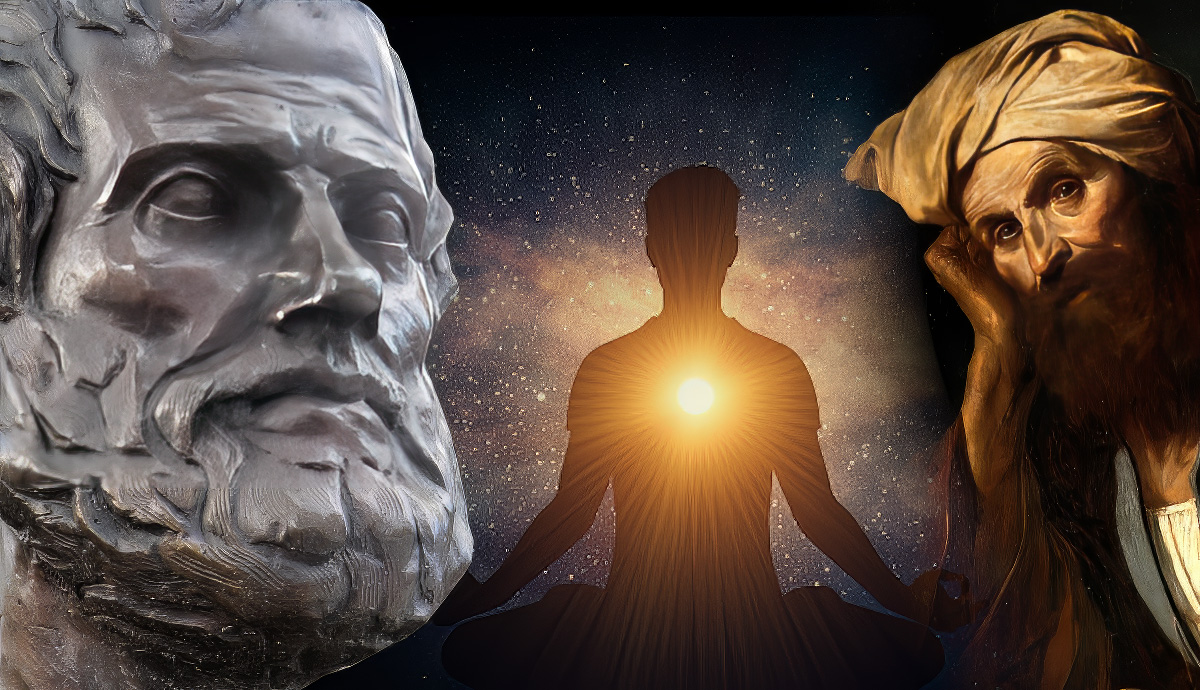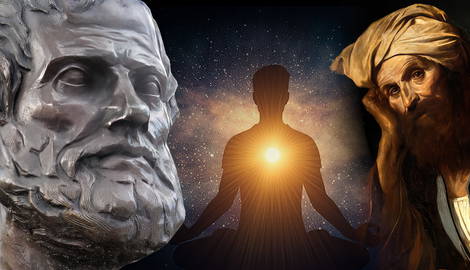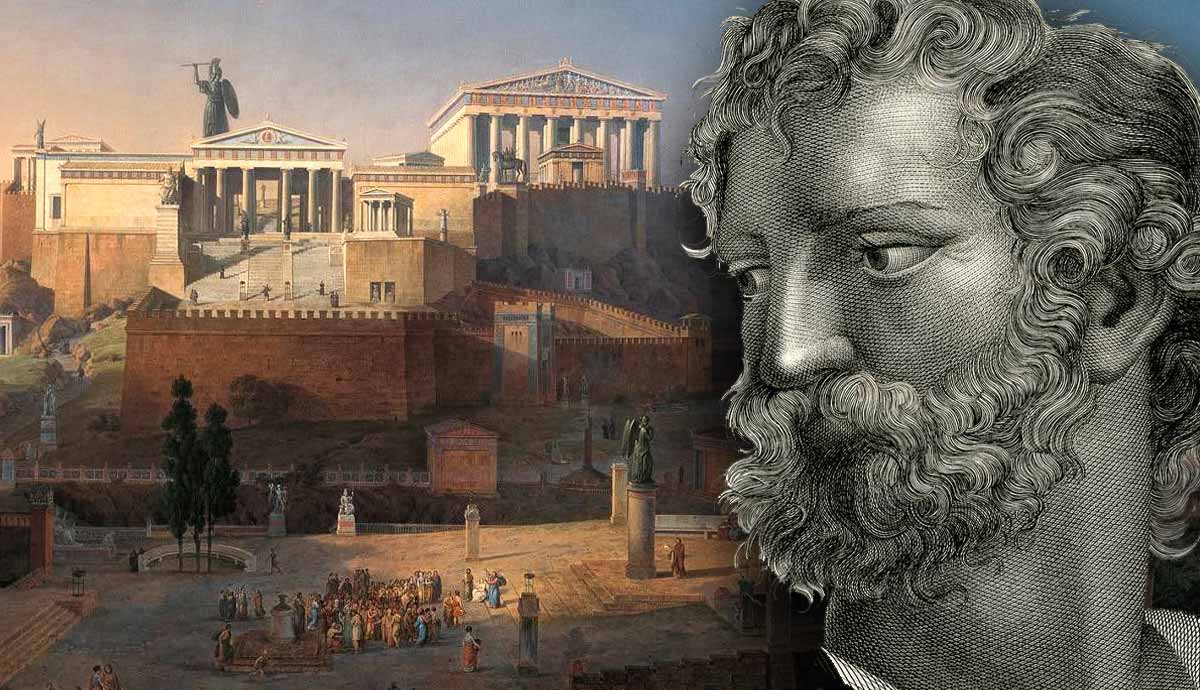
Do we inherit souls which are finished, or must we develop them intentionally? For Ibn Sina, our souls are rational by nature and the development of our rational powers is a lifelong task. This article seeks to explore how Ibn Sina conceives of the rational soul, and how much he owes to his greatest philosophical influence: Aristotle.
This article begins by discussing some of Ibn Sina’s precursors, and how he metabolized pre-existing theories of the soul from the Greek, Christian and Islamic traditions. It then moves on to explain the relationship between the rational soul and our acquisition of different kinds of knowledge. Lastly, it considers a potential problem for Ibn Sina’s characterization of the soul, and its reconciliation with religious orthodoxy.
The influence of Aristotle on Ibn Sina

The rational soul is a concept Ibn Sina takes from Aristotle. However, Ibn Sina’s theory of the rational soul constitutes his largest break with Aristotelian thought, both in terms of his characterization of it and his preoccupation with the subject of its survival and fate. Perhaps this is to be expected: Ibn Sina was bound to focus on how God’s finite creatures relate to his divinity. Extending his philosophical system is worthwhile even if it leaves him open to the charge of long-windedness and other philosophical vulnerabilities.
Given this rupture from Aristotle, Ibn Sina draws from a wide range of other sources in constituting his theory of the rational soul. He was, of course, greatly influenced by the basic Islamic conception of the soul. He was particularly concerned to understand the doctrine that the soul will survive to body and find itself in one of several possible realms of the afterlife, some desirable and other not so, an idea that is asserted by all of the Abrahamic faiths.
Divine Effluence

Ibn Sina was also influenced by Neo-Platonists, Plotinus first amongst them. In particular, he borrowed from the neo-Platonic idea of an ‘emanationist cosmology’, which holds that all that there is participates in a flow of contingent beings which is both necessary and spontaneous, constituted by an unchanging, basic substance.
Following the neo-Platonic approach to the soul, Ibn Sina holds that human and divine intellects are the same substance (the divine effluence). The rational soul, so Ibn Sina claims, is a self-sustaining substance. It is not imprinted in any corporeal entity, including the body. Though it comes to exist at the same time as the body, it survives the body, and attains “either bliss and pleasure or misery and pain” in the afterlife.
The soul is the subject of this bliss when its substance is rendered perfect, something that can be achieved through knowledge of God (and through working for God, but we will not address that here). Attaining knowledge of God means attaining a disposition, or what we might call a power. This is the power to call all that is intelligible – all that can be understood – to mind.
The Soul and Knowledge

Ibn Sina characterizes knowledge in the following way:
“The soul then becomes like a polished mirror upon which are reflected the form of things as they are in themselves without any distortion, and whenever it stands face to face with them having been purified through knowledge, there ensues [an automatic] practicing of the theoretical sciences”.
There is a great deal of substance here, in terms of characterizing Ibn Sina’s epistemology further. First, it is telling that Ibn Sina takes our attainment of closeness to God to be a matter of knowing him, and this knowledge is not of an absolutely qualitatively distinct kind. After all, we are capable of practicing the theoretical sciences as we are, but it is far from automatic.
If this is, as it would appear, Ibn Sina’s attempt to characterize the epistemic ideal for us – what it is like to know all that we can know – then we should note both that there is a kind of Aristotelianism here. Aristotle holds that we can use experience to infer towards abstract things. In other words, to attain ‘knowledge of things as they are in themselves’.
‘The Fruit of Science’

For Ibn Sina this kind of knowledge – of things as they are in themselves – is attained by the ‘theoretical’ or ‘philosophical’ sciences, which are themselves the culmination of what we nowadays call the natural sciences. It is for this reason that Ibn Sina claimed that,
“The fruit of the science dealing with physical matters is the knowledge that the human soul survives and it has a destination”.
It is worth stating also that, as much as Ibn Sina’s conception of the soul is bound up in what the soul knows, knowledge in terms of the ‘intelligibles’ (forms in themselves) is not the only thing of value.
Prophets are capable of such profound understanding because of their extraordinary intellectual capacity, but it is only when it is combined with other intellectual and spiritual virtues, such as the imagination required to render what they know vividly, that they are able to communicate this knowledge so that almost anyone can understand it. Ibn Sina is concerned with the use of knowledge as much as he is concerned with its acquisition.
The Unseen

The divine effluence also includes knowledge about earthly events past, present and future, which Ibn Sina calls the ‘unseen’ or al-ghayb. This knowledge also, occasionally, becomes available to other human beings through dreams, visions, and prophecies.
With respect to the unseen, Ibn Sina is a pluralist in terms of how knowledge of this kind can be acquired (or rather, how one can develop the attributes in order to acquire such understanding). One who has an overactive imagination is faced with a different set of problems (in terms of how they can develop the competence of their rational soul) to a soothsayer, who might have exercised vigorously over a long period to control the humors.
The humors, incidentally, stand for the paradigmatic medieval conception of the bodies. This conception held that the balance of the four humors (phlegm, blood, yellow bile and black bile) determine many of the variances between our physical and mental tendencies.
Souls and Embodiment

Two points about Ibn Sina’s theory of the rational soul should be emphasized. First, that the function of our souls here on earth is fundamentally bound up in the function of the body. Second, knowledge has to be worked for.
Ibn Sina isn’t really a tabula rasa empiricist in spirit. He doesn’t think that we are ‘blank slates’, insofar as he places a great deal of emphasis on the various ways in which our capacities for reasoning and acquiring understanding are fixed. He believes that some rational souls just do have a better capacity for reasoning and acquiring knowledge.
However, he places a great deal of emphasis on the intentional development of whatever powers we happen to be endowed with; nobody comes into the world ready to understand the intelligibles.
Ibn Sina’s account of the rational soul intends to account for every dimension of religion, both the experience of the individual believer and the social element of religion. Being such a systematic thinker, he is also concerned to make sense of what we might call ‘paranormal phenomena’. This is a point worth emphasizing: it clearly bothers Ibn Sina that there would be phenomena which his theory cannot account for.
Paranormal Phenomena, Religious Belief, and Religious Authority in Ibn Sina’s System

Paranormal phenomena specifically might seem to present the greatest risk to holding a rational philosophical outlook within a religious one, given that many of the most important myths rely on some kind of paranormal activity. Indeed, mysticism of a kind had an (albeit fluctuating) place within Islamic orthodoxy at the time.
We can conclude by focusing on a certain kind of paranormal event, and an area in which Ibn Sina might seem to have failed to suitably resolve apparent tensions between his philosophical outlook and his religious one. The world, for Ibn Sina, is a vale of soul-making, and no one is exempt from having to develop their spiritual and intellectual powers. This perspective extends to every human being, even prophets. So far, so good. What is more controversial is that Ibn Sina takes the authority of these powers as the basis of prophetic authority. That is, Ibn Sina claims that it is by deploying these powers that the prophet knows the truths of revelations to be truths.

Why might this seem controversial? Well, for one thing it takes the ultimate warrant of religious truth to be situated not in who reveals it, but in who it is revealed to. Many religious believers, particularly in the Abrahamic faiths, take divine authority to be the mark of certainty, and that it is this which provides the truths of revelation their status as timeless truths – truths no matter what. However, as Ibn Sina has it, our embodiment is such that we are never fully free from the possibility of error.
How might Ibn Sina defend himself? Firstly, he might simply bite the bullet, pointing out that we cannot be sure that something is good just because we find it out on good authority – we must understand it for ourselves. Secondly, he might argue that this is a kind of secondary validation process, and that it is essential for the prophet to relay the truths of revelation to the masses.
However he answers, he is faced with a difficult task: balancing his conception of the ideal human being as rational and intelligent with the subordination of our beliefs to the requirements of faith.










